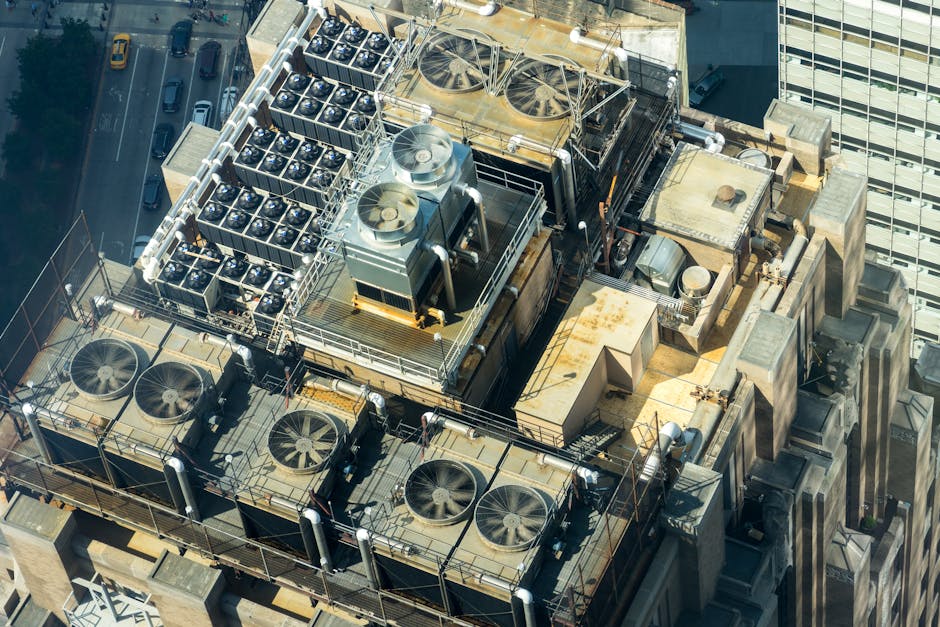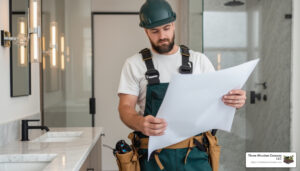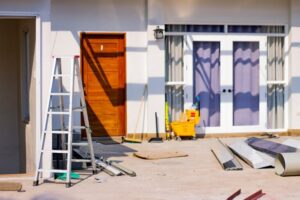Commercial HVAC Dayton Ohio is essential for businesses striving to maintain efficiency and comfort throughout the year. Whether it’s keeping a busy office cool in the summer or ensuring a factory floor is warm during the winter, commercial HVAC systems are crucial for the productivity and health of businesses across Dayton, Ohio.
- Why Commercial HVAC Matters:
- Ensures comfortable temperature for productivity.
- Increases energy efficiency, saving costs.
- Provides air quality solutions ensuring a healthy environment.
In Dayton, businesses can benefit from a range of commercial HVAC services including repair, installation, and maintenance designed to meet the unique needs of diverse commercial spaces.
Taking into account the variable Ohio climate, achieving optimal HVAC efficiency is not only about comfort but also about sustaining business operations smoothly. Properly maintained HVAC systems can lower operating costs and extend the lifespan of your equipment.

Understanding Commercial HVAC Systems
When it comes to Commercial HVAC Dayton Ohio, understanding the different types of systems can be a game-changer for businesses. The right system can improve efficiency, extend the lifespan of the equipment, and improve air controls and ventilation in your commercial space.
Types of Commercial HVAC Systems
-
Multi-Split Systems
Multi-split systems are versatile and efficient. They allow you to connect multiple indoor units to a single outdoor unit, which is perfect for businesses with varying temperature needs in different areas.
- Efficiency: These systems are known for their energy efficiency because they can cool or heat only specific areas as needed.
- Lifespan: With regular maintenance, multi-split systems can last up to 15-20 years.
- Air Controls: Offer precise temperature control for individual rooms or zones.
- Ventilation: Can be integrated with existing ventilation systems to improve air quality.
-
Rooftop Systems
Rooftop systems are a popular choice for many commercial buildings due to their space-saving design and ease of maintenance. These all-in-one units sit on the roof and handle both heating and cooling.
- Efficiency: They are designed to handle large spaces efficiently, making them ideal for warehouses and large office buildings.
- Lifespan: Typically, these systems have a lifespan of 15-20 years, depending on usage and maintenance.
- Air Controls: Provide centralized air control, which can be a plus for maintaining consistent temperatures throughout a building.
- Ventilation: Excellent for buildings that require robust ventilation systems to ensure fresh air circulation.
-
Split Systems
Split systems are among the most common HVAC systems used in commercial settings. They consist of an indoor unit and an outdoor unit.
- Efficiency: These systems are great for smaller spaces and offer good energy efficiency.
- Lifespan: With proper care, they can last between 15-20 years.
- Air Controls: Offer good control over indoor air quality and temperature.
- Ventilation: They provide adequate ventilation, but may require additional systems for larger buildings.

Choosing the right commercial HVAC system is crucial for maintaining a comfortable and productive environment. Whether you opt for a multi-split, rooftop, or split system, regular maintenance is key to maximizing efficiency and lifespan.
In the next section, we’ll explore the key considerations for ensuring your commercial HVAC system remains cost-effective and efficient throughout its lifecycle.
Key Considerations for Commercial HVAC in Dayton, Ohio
Why is Commercial HVAC So Expensive?
When you’re considering Commercial HVAC Dayton Ohio, one of the first things you might notice is the cost. Here’s why these systems can be pricey:
1. Cost Estimation and Initial Investment
Commercial HVAC systems are a significant financial investment. The initial cost includes not just the equipment but also installation and any necessary modifications to your building. Depending on the type and size of the system, costs can vary significantly.
2. Lifespan and Long-Term Value
A well-maintained commercial HVAC system can last between 10 to 20 years. While the upfront cost is high, the long lifespan means you won’t have to replace it frequently. This longevity provides value over time, especially if regular maintenance is performed to avoid major repairs.
3. Energy Efficiency and Savings
Modern HVAC systems are designed with energy efficiency in mind. Energy-efficient systems might cost more initially, but they can lead to substantial savings on energy bills. Upgrading to a new system can improve efficiency and lower operating costs, making it a wise long-term investment.

4. Variability in System Types
The cost also varies depending on the type of system you choose. Multi-split systems, rooftop units, and split systems each have different price points. The choice depends on your specific needs, such as the size of your building and the level of control you want over air quality and temperature.
5. Efficiency and Technological Advances
Technological advancements in HVAC systems have led to more efficient and complex systems. While these systems can be more expensive, they offer better performance and control over your environment. This efficiency can translate into cost savings and a more comfortable workspace.
6. Maintenance and Operational Costs
Regular maintenance is essential to keep your system running efficiently and to extend its lifespan. Routine tune-ups can prevent costly breakdowns and ensure optimal performance. While maintenance adds to the overall cost, it is a necessary expense to protect your investment.
In the next section, we’ll explore the benefits of regular HVAC maintenance and how it can improve the performance and lifespan of your system.
Benefits of Regular HVAC Maintenance
How Often Should You Schedule Maintenance?
When it comes to Commercial HVAC Dayton Ohio, regular maintenance is key to keeping your system running smoothly and efficiently. But how often should you schedule these check-ups to ensure optimal performance?
Twice a Year is Ideal
Experts recommend scheduling commercial HVAC maintenance at least twice a year. This routine helps catch small issues before they turn into costly repairs. Regular tune-ups can significantly extend the lifespan of your system, ensuring that it continues to operate efficiently.
Why Regular Maintenance Matters
-
Improved Performance: Routine maintenance keeps your HVAC system operating at its best. This means consistent temperatures and better air quality, which are crucial for a comfortable work environment.
-
Energy Efficiency: A well-maintained system uses less energy. This not only reduces your carbon footprint but also lowers your energy bills, saving you money in the long run.
-
Preventive Care: Regular check-ups help identify potential problems early. This proactive approach can prevent unexpected breakdowns that disrupt your business operations.
-
Extended Lifespan: Just like any other equipment, HVAC systems last longer with regular care. By investing in maintenance, you’re protecting your investment and ensuring you won’t need a costly replacement anytime soon.
-
Compliance and Safety: Regular maintenance ensures your system meets all safety standards and regulations, providing peace of mind for you and your employees.
In summary, scheduling maintenance twice a year ensures your commercial HVAC system performs optimally, saves energy, and lasts longer. Next, we’ll dive into the signs that indicate when your HVAC system might need repair or replacement.
Signs Your Commercial HVAC Needs Repair or Replacement
When to Consider a Replacement
Owning a commercial building in Dayton, Ohio, means keeping an eye on your HVAC system. Over time, even the best systems can show signs of wear and tear. Here’s what to look out for:
1. Inconsistent Temperatures
If some areas of your building are too hot while others are too cold, your HVAC system might be struggling. This inconsistency can disrupt the comfort of your employees and customers. It often points to underlying issues that need attention.
2. Strange Noises
Hearing unusual sounds like banging, clanking, or hissing from your HVAC system? These noises are usually signs of mechanical problems. Ignoring them can lead to more severe damage down the line.
3. Rising Energy Bills
Notice a spike in your energy costs? An inefficient HVAC system may be to blame. As systems age, they often require more energy to maintain the same level of performance. This inefficiency is a signal that it might be time to consider upgrading to a more energy-efficient model.
4. Age Matters: 10-15 Years Old
Most commercial HVAC systems have a lifespan of 10 to 20 years. If your system is approaching or has surpassed the 10-15 year mark, it’s wise to start planning for a replacement. Older systems are more prone to breakdowns and may not be as energy-efficient as newer models.
5. Frequent Repairs
If you find yourself calling for repairs more often than not, it could be more cost-effective to replace the system. Constant repairs not only add up financially but also indicate that your system might be nearing the end of its useful life.
By paying attention to these signs, you can make informed decisions about when to repair or replace your commercial HVAC system. This proactive approach helps maintain a comfortable environment and keeps your energy costs in check.
Next, we’ll tackle some frequently asked questions about Commercial HVAC Dayton Ohio to help you make the best decisions for your business.
Frequently Asked Questions about Commercial HVAC Dayton Ohio
What is the Average Lifespan of a Commercial HVAC Unit?
Commercial HVAC systems generally last 10 to 20 years. However, factors like usage, maintenance, and system quality can affect this range. Regular maintenance is crucial to extending the lifespan and ensuring optimal performance. Without proper care, systems may face major repairs sooner and become less efficient over time.
How Can I Improve Air Quality in My Commercial Building?
Improving air quality is essential for a healthy work environment. Start with air filtration. High-quality filters can capture dust, pollen, and other airborne pollutants. Regular maintenance is also key. Scheduling routine check-ups ensures that your system stays clean and functions efficiently. This not only improves air quality but also extends the life of your system.
Can a New HVAC System Reduce Energy Costs?
Yes, installing a new HVAC system can significantly reduce energy costs. Modern systems are designed to be more energy-efficient, which means they use less power to heat and cool your building. This efficiency translates to lower bills. Upgrading to a newer system can be a smart investment, especially if your current setup is over a decade old and causing rising energy costs.
By understanding these aspects of Commercial HVAC Dayton Ohio, you can make informed decisions that benefit both your building’s environment and your bottom line.
Conclusion
At Three Wooden Crosses LLC, we believe in delivering excellence and ensuring complete customer satisfaction. Our commitment to top-quality service is unwavering, and we strive to make your experience with us as seamless as possible. Whether you’re upgrading your commercial HVAC system or need routine maintenance, our team is here to help.
We understand that a well-functioning HVAC system is crucial for your business. It not only keeps your environment comfortable but also plays a vital role in maintaining productivity and safeguarding inventory. Our certified professionals are available 24/7 to address any HVAC needs you may have. We pride ourselves on our reliability and expertise, ensuring that your system is always in the best hands.
Choosing Three Wooden Crosses LLC means partnering with a team dedicated to excellence. We focus on building lasting relationships through trust and high-quality service. Our clients often recommend us to their friends and family, which speaks volumes about our dedication and reliability.
For more information about our comprehensive HVAC services, visit our services page. Let us help you achieve optimal comfort and efficiency with your commercial HVAC system.




